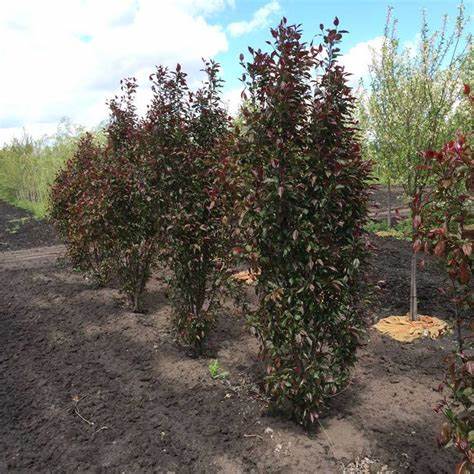1
/
of
1
Riverdene Garden Center
Purple Spire Columnar Crabapple
Purple Spire Columnar Crabapple
Regular price
$99.99 CAD
Regular price
Sale price
$99.99 CAD
Unit price
/
per
Couldn't load pickup availability
Malus ‘JFS-KW213MX’ Purple Spire®
Purple Spire Columnar Crabapple is a narrow, upright ornamental tree with deep purple foliage, pink flowers, and small burgundy fruit that persists into winter. It is a cold-hardy, low-maintenance tree that thrives in prairie climates (Zone 3), making it an excellent choice for small yards, urban landscapes, and tight spaces in Southwest Saskatchewan.
Planting & Location
- Hardiness Zone: 3-7 (well-suited for cold winters)
- Mature Size: 15-20 feet tall, 6-8 feet wide
- Growth Rate: Moderate (12-18 inches per year)
- Sunlight Needs: Full sun (at least 6 hours of direct sunlight per day)
-
Soil Preference:
- Prefers well-drained, loamy soil.
- Tolerates clay, sandy, and slightly alkaline soils.
- Avoid poorly drained or wet soils—crabapples dislike standing water.
- Spacing: 6-8 feet apart for a hedge, 8-10 feet apart for individual trees.
Watering
- Young Trees (First 2 Years): Deep water once per week to establish roots.
- Established Trees: Water every 2-3 weeks in dry periods.
- Avoid Overwatering: Let the topsoil dry between waterings to prevent root rot.
Fertilizing
- First Year: No fertilizer needed—focus on root establishment.
-
Mature Trees:
- Apply a slow-release balanced fertilizer (e.g., 10-10-10) in early spring.
- Organic alternative: Compost or aged manure in spring.
Pruning & Maintenance
- Best Time to Prune: Late winter to early spring, before new growth starts.
-
How to Prune:
- Remove dead, diseased, or crossing branches to improve airflow.
- Maintain a strong central leader for upright growth.
- Light shaping as needed—minimal pruning required.
Pest & Disease Management
Common Pests:
-
Aphids – Can cause curled leaves and sticky honeydew.
- Solution: Spray with insecticidal soap or encourage natural predators (ladybugs).
-
Apple Maggot – Larvae tunnel inside fruit.
- Solution: Use sticky traps and clean up fallen fruit.
-
Tent Caterpillars – Form web-like nests in branches.
- Solution: Prune out nests and destroy them.
Common Diseases:
-
Apple Scab – Causes dark, scabby lesions on leaves and fruit.
- Solution: Choose disease-resistant varieties and apply fungicide if needed.
-
Fire Blight – Causes black, scorched-looking branches.
- Solution: Prune infected areas 8-12 inches below infection and disinfect tools.
-
Powdery Mildew – White fungal growth on leaves.
- Solution: Improve air circulation and remove infected leaves.
Winter Protection
- Young Trees: Protect trunks with tree wrap or guards to prevent sunscald and frost cracks.
- Mulching: Apply 2-4 inches of mulch around the base to insulate roots.
- Deer & Rodents: Use tree guards if browsing is an issue.
Landscape Uses
Perfect for narrow spaces and small yards
Low-maintenance and highly ornamental
Deep purple foliage provides year-round interest
Beautiful pink spring flowers attract pollinators
Small fruit provides food for birds in winter
Additional Notes:
- Purple Spire Columnar Crabapple is one of the best compact ornamental trees for small urban gardens and narrow spaces.
- Lifespan: 20-40 years with proper care.
- Works well as a specimen tree, street tree, or privacy screen.
Photo courtesy of Foothills Nursery
Share


